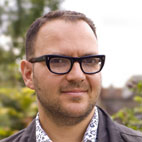
Cory Doctorow, "Who Governs Digital Trust?"
 This lecture was presented as part of The Long Now Foundation’s monthly Seminars About Long-term Thinking.
This lecture was presented as part of The Long Now Foundation’s monthly Seminars About Long-term Thinking.
The Coming Century of War Against Your Computer
Tuesday July 31, 02012 – San Francisco
Video is up on the Doctorow Seminar page for Members.
*********************
Audio is up on the Doctorow Seminar page, or you can subscribe to our podcast.
*********************
Who governs digital trust?- a summary by Stewart Brand
Doctorow framed the question this way: “Computers are everywhere. They are now something we put our whole bodies into—airplanes, cars—and something we put into our bodies—pacemakers, cochlear implants. They HAVE to be trustworthy.”
Sometimes humans are not so trustworthy, and programs may override you: “I can’t let you do that, Dave.” (Reference to the self-protective insane computer Hal in Kubrick’s film “2001.” That time the human was more trustworthy than the computer.) Who decides who can override whom?
The core issues for Doctorow come down to Human Rights versus Property Rights, Lockdown versus Certainty, and Owners versus mere Users.
Apple computers such as the iPhone are locked down—it lets you run only what Apple trusts. Android phones let you run only what you trust. Doctorow has changed his mind in favor of a foundational computer device called the “Trusted Platform Module” (TPM) which provides secure crypto, remote attestation, and sealed storage. He sees it as a crucial “nub of secure certainty” in your machine—but only to the extent that it is implemented to allow owners to choose what they trust—not vendors or governments.
If it’s your machine, you rule it. It‘s a Human Right: your computer should not be overridable. And a Property Right: “you own what you buy, even if it what you do with it pisses off the vendor.” That’s clear when the Owner and the User are the same person. What about when they’re not?
There are systems where there is a credible argument for the authorities to rule—airplanes, nuclear reactors, probably self-driving cars (“as a species we are terrible drivers.”)—but at least in the case of cars, and possibly in the other two, it will not make us safer; it will make us less safe. The firmware in those machines should be inviolable by users and outside attackers. But the power of Owners over Users can be deeply troubling, such as in matters of surveillance. There are powers that want full data on what Users are up to—governments, companies, schools, parents. Behind your company computer is the IT department and the people they report to. They want to know all about your email and your web activities, and there is reason for that. But we need to contemplate the “total and terrifying power of Owners over Users.”
Recognizing that we are necessarily transitory Users of many systems, such as everything involving Cloud computing or storage, Doctorow favors keeping your own box with its own processors and storage. He strongly favors the democratization and wide distribution of expertise. As a Fellow of the Electronic Frontier Foundation (who co-sponsored the talk) he supports public defense of freedom in every sort of digital rights issue.
“The potential for abuse in the computer world is large,” Doctorow concluded. “It will keep getting larger.”
Subscribe to our Seminar email list for updates and summaries.
Join our newsletter for the latest in long-term thinking
Subscribe